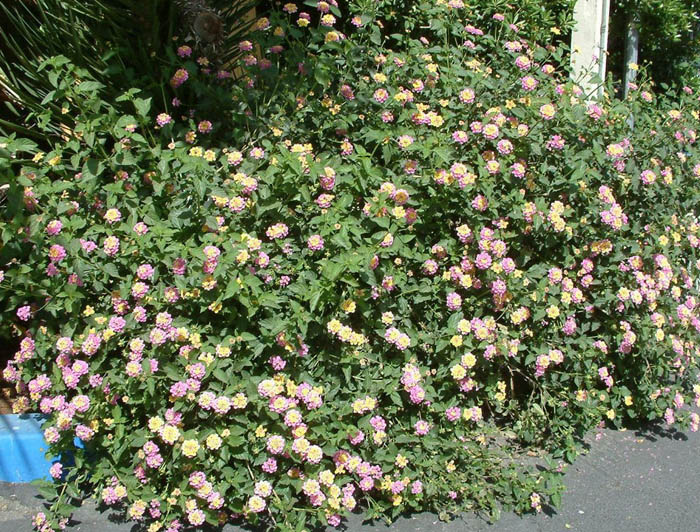Lantana camara
Camara Lantana

Description
Delightful accents of color are found with this informal shrub. It grows quickly to 10' tall. It can be controlled with pruning, and is a reliable bloomer intermittently throughout the year, benefitting from infrequent, deep waterings and a little pruning. Attracts butterflies. Lantana camara is considered an invasive species. Many nurseries carry sterile cultivars of Lantana camara that are non-invasive and safe to plant. Examples of sterile cultivars of Lantana camara include but are not limited to: 'Gold Mound', Hot Blooded™, 'New Gold', 'Alba', Patriot™ Series, Sunburst™ Series, and the Bloomify™ Series.
Maintenance Tips
Lantana camara is one of the most common flowering shrubs used in warm climates. There are dozens of varieties, all with different colors and different growth habits. This species is extremely attractive to many different pollinating birds and insects. The level of maintenance you can expect will depend on the variety you have. Many of the hybrids can grow up to 10’ tall and wide and it is common in most gardens that they are not given enough space to reach their full maturity. This plant is often the victim of box-hedging and poor pruning habits. The flowers form at the tops of the branches so the poor pruning habits cut off all of the blooming potential, leaving a woody box or ball that sends out excessive amounts of growth to try and recover. If you would like this plant in your garden, it is best to select a hybrid that only grows the size that your space will support. All of the varieties are unparticular about the soil they will grow in, and they rarely require any fertilizer to thrive. Thinning is the best way to keep the shrub healthy and to ensure you will see the blooms when they emerge.
Plant Type
Shrub
Height Range
6-12'
Flower Color
Lavender, Orange, Pink, Yellow, White, Multi-Colored
Flower Season
Winter, Spring, Summer, Fall, Constant
Leaf Color
Green
Bark Color
n/a
Fruit Color
n/a
Fruit Season
n/a
Sun
Full
Water
Medium
Growth Rate
Fast, Moderate
Soil Type
Sandy, Clay, Loam, Rocky, Unparticular
Soil Condition
Average, Poor, Well-drained, Dry
Soil pH
Neutral, Basic
Adverse Factors
Invasive
Design Styles
Mediterranean, Ranch, Seascape, Tropical
Accenting Features
Showy Flowers
Seasonal Interest
Winter, Spring, Summer, Fall
Location Uses
Background, Perennial Border, Foundation, Patio, Park, Parking Lot, Raised Planter, Swimming Pool, Walls / Fences
Special Uses
Cascade, Erosion Control, Hedge, Mass Planting
Attracts Wildlife
Butterflies
Water Saving Tip:
Mulching and adding compost to soil can minimize evaporation and help soil absorb and store water.